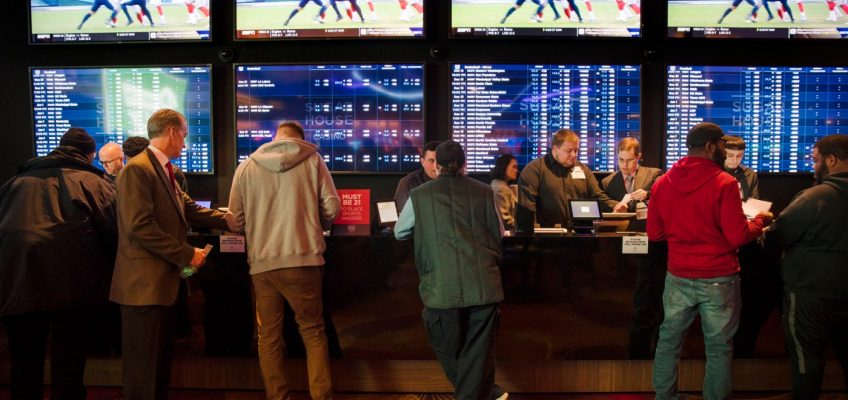With 38 states already on board, some lawmakers aim to make Minnesota the next to legalize sports betting seven years after their first attempt.
Rep. Pat Garofalo, R-Farmington, first authored a bill to legalize sports betting in Minnesota in 2018. The bill aimed to allow Minnesotans to participate in legal “onshore” sports betting versus the existing offshore private platforms.
Sen. Matt Klein, DFL-Mendota Heights, who plans to work on the legislation this session, said this initiative will make sports betting safer for Minnesotans.
“A lot of Minnesotans are already betting on sports on their telephones, on their mobile devices, and they’re doing it illegally and through offshore platforms,” he said. “What this would do is bring that activity into the legal sphere. It would have protections around problem gambling and underage gambling. If you legalize it and bring it in-house, then we’re able to make it safer and trustworthy for Minnesotans.”
The sports betting bills have been a bipartisan effort from the start, and by the end of the last legislative session, the most recent bill gained the support of all 11 Native American tribes in the state and from the state’s horse racing tracks in Shakopee and Columbus, according to Klein.
“Tribes believe the resulting mobile and retail markets operated by Minnesota’s Tribal Nations would not only support tribes but also provide a well-regulated and accessible market for the state’s sportsbettors,” Minnesota Indian Gaming Association said in a letter to the Human Services Committee last year. “Gaming revenues produce the essential tax base tribes rely on to fund basic and essential government services for thousands of tribal members.”
But members of Klein’s caucus have shown some resistance to legalizing sports betting in Minnesota. Sens. John Marty, DFL-Roseville; Erin Maye Quade, DFL-Apple Valley; and Scott Dibble, DFL-Minneapolis, issued a joint statement Nov. 18 following a University of Oregon study that linked sports betting to domestic violence.
“As the Legislature has considered legalizing sports gambling in Minnesota, virtually all the discussion has been focused on the benefits to those who would profit from bookmaking,” the statement read. “Unfortunately, there has been little to no discussion of the health impacts or the economic harm from that legalization. The addictive nature of online sports betting is already well-documented, with known links to financial hardship, mental health struggles and suicide.”
The study on domestic violence and sports betting found that after losses in certain sporting events, there is a 10% increase in intimate partner violence in states that legalized sports betting compared to those that have not.
“Legislative debate over sports betting must include a recognition that this legislation will make the horrific problem of family violence even more common,” the statement read. “We call on our legislative colleagues to conduct thorough hearings on the harmful impacts of sports bookmaking, addressing both the financial costs and the human toll, including domestic violence.”
Klein said he takes the issues that have commonly been raised for sports betting like addiction and domestic violence very seriously but said the study cited by his colleagues is illegitimate.
“This particular study uses statistics to try to prove a fraction of a percentage of cases involving domestic violence will increase, and it hasn’t been published in any medical journal,” Klein said. “Domestic violence is a very serious issue and a tragedy, and I don’t think it’s helpful to use it to score a political point or to achieve a political outcome. We should address domestic violence, but legalizing sports wagering in the state of Minnesota will not have an impact on that.”
Another group that voiced opposition to legalizing sports betting is the Joint Religious Legislative Coalition, which argued legal sports betting will intensify already existing struggles for those addicted to it. In a letter to the Legislature in March, the religious coalition said while some people may be able to enjoy sports betting as a form of entertainment, they believe it is a more serious issue for a “significant portion” of Minnesotans.
“According to a 2020 survey by the Wilder Foundation and the MN Department of Human Services, 1.3% of adults in Minnesota are problem gamblers, which represents just over 56,000 adults,” the coalition wrote. “An additional 3.8% (nearly 162,000 adults) are at-risk gamblers. Another 22% of people had been negatively impacted by the addiction of a loved one or someone they know. This is before the sweeping legalization we are discussing now.”
Klein said he put some protections in the bill to address the concerns that arise with sports betting, such as guardrails for advertising on college campuses and what’s called a “three-hour delay” where people would wait three hours before using any new deposits to an account for betting, helping to prevent impulsive wagers.
Klein said the legalization would generate profits not only for booking platforms but for state tax revenues for Minnesota, a portion of which could fund treatment services for gambling addictions.
Going forward, Klein said he feels hopeful 2025 could be the year sports betting passes, and the Minnesota House being tied 67-67 might put the bill in a more promising spot this year.
“The only things that I think we’ll be able to really pass this year are bipartisan initiatives, given the state of the House and a very close division in the Senate, and sports wagering is one of the few things that from day one was a bipartisan issue,” he said. “I think that gives it a smoother pathway than other bills.”
Related Articles
Longtime Duluth-area lawmaker Mary Murphy dies at 85
Mary Murphy, Minnesota’s longest-serving woman legislator, in hospice care after stroke
Jim Abeler: The DFL overspent, didn’t listen, and now a deficit is coming. It doesn’t have to be this way
Justin Terrell: Reimagining justice by ‘pivoting from problem to possibility’
Judge disqualifies DFL House candidate over Roseville residency; ruling could grant majority to GOP


Leave a Reply